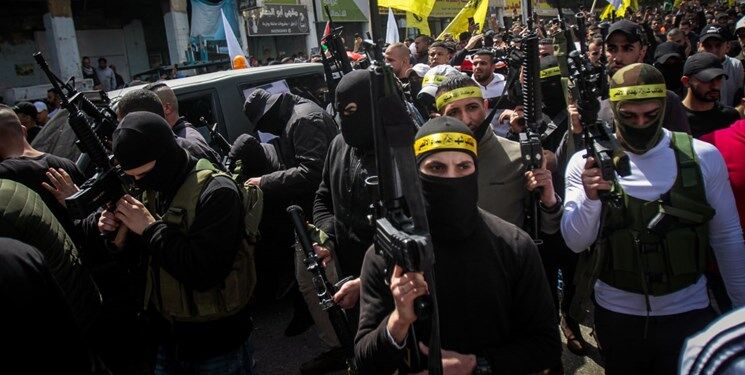Isaac Robin, the then Prime Minister of the Zionist regime, said at the time of the first intifada, I wish, one day, to wake up and see all of Gaza sunk in the sea and get rid of this region. Isaac Robin died in 1995 and his dream was buried with him, but Palestine is still alive, and Gaza, against Robin’s wishes, has today become one of the most equipped and powerful Palestinian fronts in the occupied territories, with more than 4,000 rockets fired in just 11 days in last year’s Battle of Beit ul-Moqaddas. The Gaza Strip fired on Israeli-occupied areas, landing one of the world’s most powerful armies, equipped with state-of-the-art defense systems.
The Palestinian resistance is no longer going to war with the Zionists with stones or minimal operational facilities and light and worn-out weapons, but is armed with indigenous and powerful equipment in the field of missile, drone and artillery industries. These weapons, while inflicting heavy damage on the military, economic and industrial infrastructure of the Israeli regime, have changed the “balance of power” in the occupied territories. The missile capabilities of the Palestinian resistance groups are such that Hamas has announced that it has enough missiles that it can continue to fight the Zionist regime for six consecutive months.
The Palestinian “missile arsenal” with tens of thousands of precision missiles with a range of more than 250 km has enabled the Palestinians to achieve a significant level of “asymmetric” and “direct” deterrence in the occupied territories, and has turned the Palestinian deterrent power from occupied Quds to the West Bank to a “dangerous and vital threat” for the Zionist regime.
Given that deterrence is defined in terms of “deterrent military power and weapons”, the Palestinian resistance, in addition to its advanced missile equipment and so on also unveiled its advanced and new missile, named “Qassem” in memory of Martyr General Soleimani, this year that will definitely cause a growing “surprise” to the Zionists in future battles. A significant portion of these missiles are stationed in a small, besieged strip of southwestern Palestine, i.e. Gaza, which is tightly controlled by the Zionists!
But the important issue here is the “strategic implications” of enhancing Palestinian deterrence for the Zionist regime’s security, military, political, economic, and demographic areas, some of which are outlined below:
One: It has prevented the military superiority of the Zionist regime in the occupied territories and has thwarted its efforts to contain the Palestinians;
Two: it has significantly increased the costs of any military-security aggression and adventure of the Zionist regime;
Three: It has strengthened the balance of horror in the occupied territories;
Four; It has disrupted and weakened the Zionist regime’s strategic calculations and strategic bargaining power against Palestinian resistance groups;
Five: The deterrence and security factor of the Zionist regime has been drastically reduced and the threshold of operational tolerance and resilience of this warmonger and aggressor regime, whose life depends on inciting war, crisis and aggression, to less than a week against the resistance groups;
Six: It has increased political protests and opposition to the performance of the Zionist regime’s cabinet;
Seven: It has led to a political crisis and sharp divisions within the Zionist regime;
Eight: While depriving the Zionist inhabitants of their psychological security in the occupied territories, it has destroyed their trust and confidence in the Zionist army;
Nine: Through “reverse migration” or “irreversible migration”, the exodus of Jews from the occupied territories has intensified. According to estimations of Zionist centers, by 2030, Jews and Palestinians will make up respectively 42 and 58 percent of the population of occupied Palestine;
Ten: It has intensified the economic crisis and also reduced the attraction of foreign investment in the occupied territories;
The deterrent power and combat and operational capability of the Palestinians in the occupied territories, of which the Islamic Resistance has unveiled new dimensions deep in Tel Aviv in recent weeks, is so “terrible” that Israeli security officials, especially Secretary of War Bani Gantz, wrote a letter to the military forces to refrain from any direct confrontation with Gaza and instead resort to sanctions such as closing crossings.
This shows that the Palestinian Islamic Resistance, in addition to severe deterrence, has also achieved “soft deterrence”, of which “denial of access” and “regional obstruction” are two main strategies. As part of the “no access” strategy, the Palestinians have prevented Israeli forces from entering sensitive and disputed areas.
In the “regional deterrence” strategy, Palestinian resistance groups, by increasing spending, have stripped the Zionist regime of its freedom of action and its offensive and operational power in a significant part of the occupied territories.
In this regard, the Zionist historian Bani Morris, observing the developments of the last year in the occupied territories, says: In the upcoming years, the Arabs and Muslims will become victorious and the Jews will turn into minority in this territory or will be evicted or killed. Those who are lucky, are the ones who flee to Europe. In the words of former Mossad chief Efraim Halevy, “Israel is on the brink of disaster. “This darkness is before the abyss.”










0 Comments